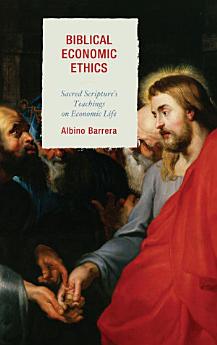Biblical Economic Ethics: Sacred Scripture's Teachings on Economic Life
Aug 2013 · Bloomsbury Publishing PLC
Ebook
378
Pages
reportRatings and reviews aren’t verified Learn More
About this ebook
Written in non-technical language accessible to non-specialist readers, this book is a theological synthesis of the findings of scripture scholars and ethicists on what the Bible teaches about economic life. It proposes a biblical theology of economic life that addresses three questions, namely:
What do the individual books of Sacred Scripture say about proper economic conduct? How do these teachings fit within the larger theology and ethics of the books in which they are found?Are there recurring themes, underlying patterns, or issues running across these different sections of the Bible when read together as a single canon?
The economic norms of the Old and New Testament exhibit both continuity and change. Despite their diverse social settings and theological visions, the books of the Bible nonetheless share recurring themes: care for the poor, generosity, wariness over the idolatry of wealth, the inseparability of genuine worship and upright moral conduct, and the acknowledgment of an underlying divine order in economic life.
Contrary to most people’s first impression that the Bible offers merely random economic teachings without rhyme or reason, there is, in fact, a specific vision undergirding these scriptural norms. Moreover, far from being burdensome impositions of do’s and don’ts, this book finds that the Bible’s economic norms are, in fact, an invitation to participate in God’s providence. To this end, we have been granted a threefold benefaction—the gift of divine friendship, the gift of one another, and the gift of the earth. Thus, biblical economic ethics is best characterized as a chronicle of how God provides for humanity through people’s mutual solicitude and hard work. The economic ordinances, aphorisms, and admonitions of the Old and New Testament turn out to be an unmerited divine invitation to participate in God’s governance of the world.
Our economic conduct provides us with a unique opportunity to shine forth in our creation in the image and likeness of God. Often extremely demanding, hard, and even fraught with temptations and distractions, economic life nevertheless is, at its core, an occasion for humans to grow in holiness, charity, and perfection.
What do the individual books of Sacred Scripture say about proper economic conduct? How do these teachings fit within the larger theology and ethics of the books in which they are found?Are there recurring themes, underlying patterns, or issues running across these different sections of the Bible when read together as a single canon?
The economic norms of the Old and New Testament exhibit both continuity and change. Despite their diverse social settings and theological visions, the books of the Bible nonetheless share recurring themes: care for the poor, generosity, wariness over the idolatry of wealth, the inseparability of genuine worship and upright moral conduct, and the acknowledgment of an underlying divine order in economic life.
Contrary to most people’s first impression that the Bible offers merely random economic teachings without rhyme or reason, there is, in fact, a specific vision undergirding these scriptural norms. Moreover, far from being burdensome impositions of do’s and don’ts, this book finds that the Bible’s economic norms are, in fact, an invitation to participate in God’s providence. To this end, we have been granted a threefold benefaction—the gift of divine friendship, the gift of one another, and the gift of the earth. Thus, biblical economic ethics is best characterized as a chronicle of how God provides for humanity through people’s mutual solicitude and hard work. The economic ordinances, aphorisms, and admonitions of the Old and New Testament turn out to be an unmerited divine invitation to participate in God’s governance of the world.
Our economic conduct provides us with a unique opportunity to shine forth in our creation in the image and likeness of God. Often extremely demanding, hard, and even fraught with temptations and distractions, economic life nevertheless is, at its core, an occasion for humans to grow in holiness, charity, and perfection.
About the author
Albino Barrera is professor of theology and economics at Providence College. His books include Market Complicity and Christian Ethics (2011), Globalization and Economic Ethics: Distributive Justice in the Knowledge Economy (2007), Economic Compulsion and Christian Ethics (2005), God and the Evil of Scarcity: Moral Foundations of Economic Agency (2005), and Modern Catholic Social Documents and Political Economy (2001).
Rate this ebook
Tell us what you think.
Reading information
Smartphones and tablets
Install the Google Play Books app for Android and iPad/iPhone. It syncs automatically with your account and allows you to read online or offline wherever you are.
Laptops and computers
You can listen to audiobooks purchased on Google Play using your computer's web browser.
eReaders and other devices
To read on e-ink devices like Kobo eReaders, you'll need to download a file and transfer it to your device. Follow the detailed Help Center instructions to transfer the files to supported eReaders.








